March 16 – 31, 2024 | Celebrating our Collections
We’re thrilled to celebrate the museum’s collections during spring break 2024. From March 16-31, we’ll focus on one of our collections every day. Be sure to visit on your favourite day, and we hope you visit multiple times to see it all!
With themed colouring sheets, scavenger hunts, and activities we have everything in place for a self-led exploration of the collections. Investigate at your own pace throughout the day, and plan to join one of our half-hour highlights or hands-on activities featuring the day’s theme to round out your visit! Find our topics on the daily schedule!
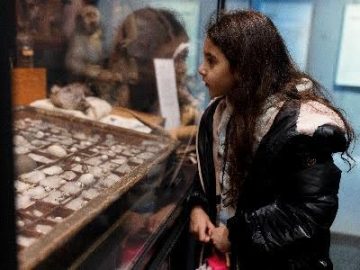
Photo by Sarah Race, 2023, used with permission.
The Beaty Biodiversity Museum reserves the right to change or modify programming as needed. Please note that the Beaty Biodiversity Museum is closed on Mondays and statutory holidays.
The museum is open to all ages and our activities are included with membership or museum admission on a drop-in basis. Children under the age of 13 must have adult supervision in the museum at all times. Please visit our accessibility page if you have any access questions!
Are you offering a spring break camp? Check out our in-person program options for private, hands-on, biodiversity experiences suitable for your group.
Herbarium: Plants & Algae | Spring Break 2024 | March 20, 28
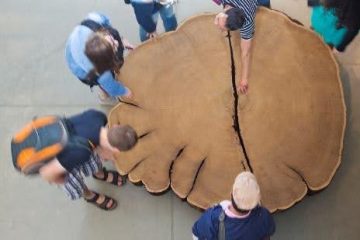
Four university students look at a very large cross-section of a western red cedar tree trunk, Thuja plicata. https://collections.beatymuseum.ubc.ca/100-treasures/treasure-34
We will be focusing on our photosynthetic friends – plants and algae. Meet mosses, find a fern, touch a tree, see a seaweed, and fawn over flowers!
Extend your learning at home:
- Learn about how herbarium specimens are used for research with Jamie;
- Download and print a plant guide and log for common plants at UBC;
- Explore amazing algae from the seashore to the herbarium floor!
- How do you press plants for art and science? Learn more here;
- Learn about the herbarium at the Beaty Biodiversity Museum;
- Extend your time at UBC! Spend some time at the UBC Botanical Garden.
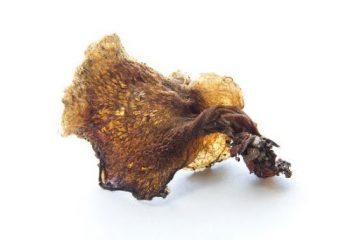
A dried, brown, translucent fungus. Great spirit gummy bear; “Pseudohydnum gelatinosum”. https://collections.beatymuseum.ubc.ca/100-treasures/treasure-16
Herbarium: Fungi & Lichen | Spring Break 2024 | March 16, 28
We will focus on Lichen and Fungi – two types of organisms that are kept in the herbarium but are not plants! Lichens are a composite organism made up of a fungus and an alga. Fungi are eukaryotes with a wide range of different growth forms.
Extend your learning at home:
- Use our Mushrooms Up! guide to some common mushrooms of the Pacific Northwest;
- The Ways of Enlichenment showcases the beauty, mystery, and science of lichens;
- The BC Ministry of Forests published an illustrated key to the Lichens of British Columbia!
- Learn about the herbarium at the Beaty Biodiversity Museum;
- Extend your time at UBC! Spend some time at the UBC Botanical Garden.

A bald eagle, “Haliaeetus leucocephalus”, stands on a sandy beach. Photo by Sunny Zhang, used with permission.
Tetrapods | Spring Break 2024 | March 19, 24
We will be highlighting birds, mammals, reptiles, and amphibians, the four groups of vertebrates in the Cowan Tetrapod Collection. While you’re outdoors today, see if you can spot any tetrapod neighbors near the museum!
Extend your learning at home:
- Click here and find an animal that starts with each letter of the alphabet – be descriptive to try to get the toughest letters!
- Learn about mammals and birds that live at UBC in these guides: Bird Guide and Mammal Guide;
- Head to a local park and observe the signs of spring, finding and sketching your findings along the way!
- Learn about how camera traps are used to research mammals with Cole;
- Roseanna talks about Western toads in Haida Gwaii;
- Learn about the Cowan Tetrapod Collection at the Beaty Biodiversity Museum.
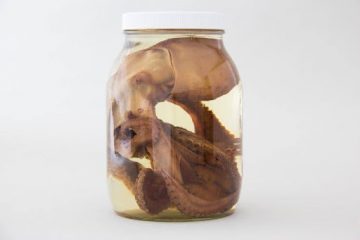
A giant Pacific octopus, “Enteroctopus dofleini”, preserved in a jar. https://collections.beatymuseum.ubc.ca/100-treasures/treasure-13
Marine Invertebrates | Spring Break 2024 | March 22, 31
We will be focusing on our squishy friends who live in the ocean – marine invertebrates! “Invertebrate” means without a backbone, and this includes creatures like snails, octopuses, sea stars, and more!
Extend your learning at home:
- Colour a copepod while you learn about their life cycle;
- Focus on classification using Marine Invertebrates. It’s a great group activity for the beach!
- Angela researches wonders of the deep, including glass sponges and feather stars;
- Head to your local beach! Download a field guide to 40 prominent intertidal species of marine life that inhabit the rocky shore in Stanley Park; Vancouver, BC. By Sheila Byers;
- Learn about the Marine Invertebrate collection at the Beaty Biodiversity Museum.
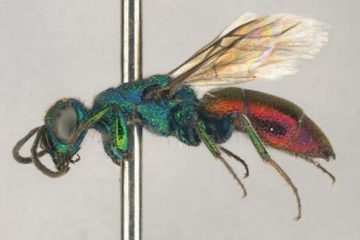
An iridescent cuckoo wasp, “Chrysis provancheri”, with green head, green thorax, and red abdomen. https://collections.beatymuseum.ubc.ca/100-treasures/treasure-48
Entomology | Spring Break 2024 | March 23, 26
We are focusing on insects and other arthropod relatives. Use magnifying glasses to look up close, identify and classify major groups of insects, and create your own insect comic strip or storyboard!
Extend your learning at home:
- Print your own insect guide to learn about common critters at UBC!
- Michelle explains her research, learning about how insects respond to climate change;
- Danica worked on a project exploring mosquito distribution;
- Have you wondered what’s in a wasp nest? Watch Nancy as she dissected a nest live over Zoom in 2020;
- Join artist Bea Martin: her Curiosity, Creativity & Beyond website shows specimens from the Spencer Collection and has videos detailing how to draw eight different “bugs” (seven insects and a vinegaroon);
- Visit our YouTube channel to learn about dragonflies, new species of spiders, and more!
- Learn about the Spencer Entomological Collection at the Beaty Biodiversity Museum.

A sockeye salmon, “Oncorhynchus nerka”, with a hooked jaw is preserved in a large jar. https://collections.beatymuseum.ubc.ca/100-treasures/treasure-14
Fishes | Spring Break 2024 | March 17, 27
Our focus will be on our aquatic fishy friends! Fishes are animals that live in water and have a backbone and gills. Fishes range from tiny little sardines to top predators like great white sharks; and from scary-looking monkfish to elegant angelfish!
Extend your learning at home:
- Learn about the Sturgeon Harpoon Knowledge web;
- Dolph talks about how new species form and how they are different from each other, focusing on sticklebacks;
- Trout conservation is a complex problem worked on by many people, including Trish, Jared, and Kai;
- Learn about the Fish Collection at the Beaty Biodiversity Museum.
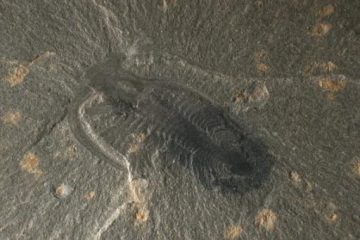
“Marella”, a fossil marine invertebrate, impression preserved in dark rock. https://collections.beatymuseum.ubc.ca/100-treasures/treasure-47
Fossils | Spring Break 2024 | March 21, 30
Our focus will be on fossils, the preserved remains or traces of organisms. They can be the shells of marine invertebrates, the bones of fish, the footprints of a dinosaur, the impression of leaves, and more. Fossils can tell us about ancient life on Earth and help us understand present-day biodiversity.
Join us on March 21 for a fossil-themed Nocturnal! Extend your learning at home:
- Meet Ludo, who studies fossil fungi;
- Walk through time, in person or online, with the Beaty and Pacific Museum of Earth;
- Learn about the Fossil Collection at the Beaty Biodiversity Museum;
- One of our favourite evolution resources is from the University of California Museum of Paleontology. Explore online!
- Explore the Digital Atlas of Ancient Life;
- Extend your time at UBC. Spend some time at the Pacific Museum of Earth!
